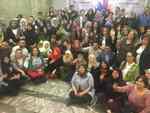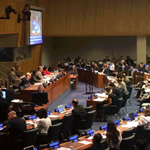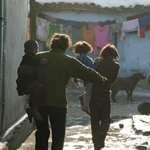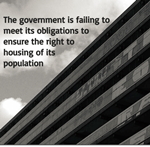Social Watch news
Published on Thu, 2017-09-14 11:54
New Census numbers released this week show that overall incomes have risen in the past ten years in Canada. This is excellent news. Economic growth driven by rising wages is growth we can feel, growth that translates into a better life.
However, not all Canadians are having the same experience. When you look at different parts of Canada, and different Canadians, you see some important differences. This Census release doesn’t include the differences in income and poverty experienced by racialized, indigenous, and immigrant groups. For that information, we have to wait another month. However, you can already see differences in the wages of men and women and very different levels of poverty depending on which city you live in (or if you live in a city at all).
|
Published on Mon, 2017-09-11 09:25
It will not be possible to implement the Sustainable Development Goals (SDGs) in Brazil. This sad prospect is a consequence of the lack of the necessary budgetary allocations, resulting from the current austerity policies of the Temer administration. Such policies establish a cap for social expenses and promote budgetary cuts of over 50 percent in many governmental bodies, along with other reforms that lead to social exclusion, increase inequalities and relinquish the national wealth via privatization processes.
The current government of Brazil lacks legitimacy to promote actions and thus it uses the SDG discourse to justify its policies while at the same time rendering these same SDGs unattainable as a result of its political and economic decisions.
|
Published on Mon, 2017-09-11 09:23
In its civil society shadow report a wide coalition of civil society organizations from Germany formulates analyses, criticism and recommendations for action in 17 areas, from poverty in old age to German foreign policy. The report opens with cross-sectoral analyses on areas that cannot be sufficiently located within the logic of the 17 SDGs, as for example, on the subject area ‘populism’ or the issue of international tax cooperation. The report also addresses the policies of the German government, whatever political configuration may come out after the federal election in September of 2017. The report concludes that "relying on a change in awareness of consumers and producers alone will not bring us closer to the goal of sustainability fast enough."
|
Published on Thu, 2017-09-07 20:27
The Iraqi Women Network held a national conference in Mosul after the city was recovered by the government, with the participation of women from various cities in Iraq, civil society activists and women who have resisted the culture of violence, exclusion and terrorism during the rule of ISIS.
The conference declaration stresses Iraqi women’s determination to play a real role in the process of political reform "to eliminate the abhorrent sectarian system and combat against corruption, and insuring accountability and no impunity for the criminals or anyone involved in corruption, and building a state of institutions based on respect for human rights and the principles of citizenship and integrity."
|
Published on Mon, 2017-09-04 07:52
Nepal has faced one socioeconomic shock after another in a relatively short period of time, be it the ten- year civil war or the devastating earthquake or the unstable government, which has changed 25 times since the restoration of democracy in 1990.
At the end of 2015, the government introduced the Public Private Partnership (PPP) policy followed by trainings and programmes emphasizing the need for private investment to finance public services, especially for the SDGs. The ultimate need of private entities to maximize profits in order to stay in business is fundamentally incompatible with protecting the environment and ensuring universal access to quality public services. This is evident in the failure of Kathmandu Upatyaka Khanepani Ltd. (KUKL), the first PPP scheme in 2008, to deliver its promise to improve the water delivery efficiency around Kathmandu Valley. High water tariffs, undersupply of water and high deficits also shows the inefficiency of the board, chaired by the representative from a private sector, along with KUKL.
|
Published on Mon, 2017-09-04 07:49
When Hungarian government officials talk about implementing the SDGs they mean less public expenditure in social sectors. Between 2010 and 2015 the Orbán government on the one hand increased state expenditures, doubled spending on the economy, and significantly increased spending by allocating about US$ 340 million annually on sports, mainly for building football stadiums. On the other hand, it decreased expenditures on public health, education and pensions.
The government did not save only on pensioners, but also on unemployment benefits, by decreasing their size and duration even when they were taking place on an insurance basis. These measures decreased annual family support expenditures as well, which can be explained by a decrease in the number of children and the decades-long freeze in services. Social benefits were decreased, while extreme poverty increased over the past eight years.
|
Published on Thu, 2017-08-31 12:30
Following 8 days involving 43 Voluntary National reviews (VNR) and 147 side events with 77 ministry-level participations and 2458 registered stakeholder representatives, the statistical outlook of the 2017 High-Level Political Forum on Sustainable Development Goals is quite promising. It is only the second review and just two years after the kick-off for the implementation of a universal agenda towards leaving no-one behind. Yet, time is marching on and there is a long way to go on the level of implementation.
At the 2017 HLPF, Jordan became the third country from the Arab region to participate in the VNR process; following Egypt and Morocco in the 2016 review. The first words of Jordan’s national report made reference to the same issues: ‘the power of working together’ and taking into consideration ‘the urgent world issues’.
|
Published on Wed, 2017-08-23 09:46
Guatemala should abandon the old patterns of ‘development’ based on the extraction of natural wealth, environmental predation and exploitation of cheap labour, and turn its gaze towards more creative and inclusive forms of production, promote democracy and make the distribution of wealth and political power more equitable, recommends the civil society report on the SDGs contributed by Helmer Velasquez and Arlyn Jimenez of the Coordination of NGOs and Cooperatives of Guatemala (CONGCOOP).
|
Published on Wed, 2017-08-23 09:21
Bulgaria is the poorest EU member state, with almost half of its children living in low-income households and more than half of elderly people with pensions below poverty line. The Bulgarian Gender Research Foundation (BGRF) and Bulgarian Social Watch coalition report that policies shaped by EU priorities and advice provided by the IMF and the World Bank declare as their fundamental purpose “the struggle against poverty”, but "they keep on demanding economic reforms which have proved to be totally inefficient". The leading assumption is that only the free market and strictly restricted government intervention can guarantee prosperity. Once adopted, "no one measures whether the welfare of people has improved, but only to what extent the recommended neoliberal policies have been implemented".
|
Published on Sun, 2017-08-20 23:08
The present and future of economic and social rights in the UK will depend considerably on the legal and policy consequences of the UK’s withdrawal from the European Union.
In recent years, the UK has introduced significant changes to its welfare state with the Welfare Reform Act 2012 and the Welfare Reform and Work Act 2016. The reforms were justified on two grounds: deficit reduction and ending welfare dependency by facilitating access to work.
|
SUSCRIBE TO OUR NEWSLETTER
Submit

|












